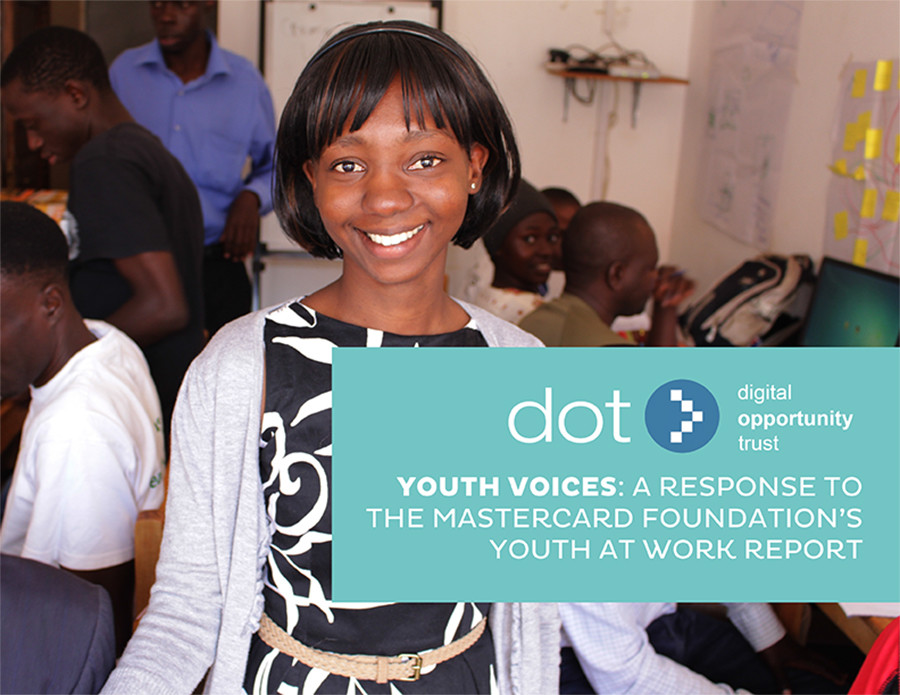
Youth Voices: A Conversation with DOT’s Young Leaders
Last year, we released Youth at Work: Building Economic Opportunities for Young People in Africa, which discussed the need for market relevant training and highlighted the vital role that young people should play in articulating their needs and aspirations for the future.
Digital Opportunity Trust (DOT), one of our largest partners, took this message to heart, and asked young people within their network to share their perspectives on our findings. These youth perspectives were compiled into Youth Voices: A Response to The MasterCard Foundation’s Youth at Work Report which both affirms and challenges our thinking, specifically in regards to young people’s needs for financial services, their use of technology and their desire for skills development programs that are tailored to local contexts.We asked the DOT youth network to share their perspectives with us,
 Diana Ninsiima, Tanzania
Diana Ninsiima, Tanzania
The MasterCard Foundation: A key theme in the report is stigma around working in agriculture. Many governments and donors are trying to encourage young people to consider opportunities in this sector. What are they doing right and what are they doing wrong?
Diana: “Our government has always stressed how important the agricultural sector is. However, I have not seen an equal amount of assistance for young people to actually engage in agricultural activities. Most youth engaging in agriculture do it as a personal initiative. They might save some money or borrow a loan and start farming. Most vacant agricultural land is found in rural areas, so any young person that wants to earn a living in agriculture, they have to relocate to those remote areas, which is difficult.
This is an area in which I believe the government and donors could help. Providing small loans to young people who are interested in the agricultural industry will motivate them and help them take that next step. Many young people would like to venture into agriculture but do not have start-up capital. Many more need help realizing that agriculture is a legitimate option. And a young person can’t just jump into it – if we want them to be successful, they need entrepreneurial skills, agricultural market information, customer identification, product research, personal saving strategies, financial literacy, technology, information about market prices, and more.”
 Alex Muwonge, Uganda
Alex Muwonge, Uganda
The MasterCard Foundation: In DOT’s Youth Voices report, you make an interesting point about how many interventions keep young people dependent on the program implementer. How can programs ensure that young people are able to establish and maintain independence?
Alex: “There is a need for programs to focus on the potential of young people. Project goals need to be based on key ideas that come from young people. Before any program is introduced, young people, as key beneficiaries, should be involved and consulted in a needs assessment. This way their issues can be adequately addressed. Programs need to empower young people to tackle their own challenges so that when the project finishes, youth are able to continue moving forward. Young people need to be given the confidence to realize that it’s up to them to make their situation better by taking full responsibility rather than waiting for interventions.”
 Carmilla Edalia, Kenya
Carmilla Edalia, Kenya
The MasterCard Foundation: You spoke about the creative services industry as being a key area of opportunity. However, the value generated from these industries is seen as small. What would you say to those who don’t think that creative industries provide viable opportunities for entrepreneurship?
Carmilla: “There is a definite change in attitudes concerning the creative industry. What was once thought of as a venture for people who didn’t perform well in school can now generate an income higher than many white collar jobs. Some of the wealthiest youth in Kenya work in creative services or the arts. People with prestigious degrees in engineering and science are leaving their fields to follow their creative passions. Engineers, doctors, and architects are now photographers, musicians and painters by choice. There is an influx of investment in the sector, but there is also deep community passion. In my opinion, developing countries tend to follow patterns of the West, particularly the United States. We see that artists and creatives are among the highest paid across the globe, and that trend has begun to catch up in Africa.”
 Joesphine Mono, Uganda
Joesphine Mono, Uganda
The MasterCard Foundation: Josephine, you said that our Youth at Work report did not discuss the challenges facing young mothers in the economy and said that we need to “find room for women and women with children in the economy.” What do donors and implementers need to do about these issues, beyond recognizing the realities that young women face?
Josephine: “Donors hold a lot of power in their hands and they can influence organizations to adopt policies that give young working mothers time to juggle work and family life. This is especially important during pregnancy and shortly after birth. Recently the Parliament of Uganda launched a day care centre for staff. This would be a good practice for all organizations to adopt, although it comes with expenses that not all organizations can afford.
The most important issue to note here is that the struggle for women is juggling commitments and choice. Maternity leave, breastfeeding hours, compassionate leave – these are provisions that must be made for working mothers, but are not provided with consistency or accountability, if they are provided at all. If donors require organizations to write family-friendly workplace practices into gender strategies and policy, it could quickly change the tide for women in Sub-Saharan Africa. Mothers can easily work and still care for their child, with the right supports. Written rules and policies are the only way for mothers to feel protected, and for there to be a true gender balance in countries where the majority of adult women are also mothers. I believe donors should invest in fair maternity and parental policies.”


